Recent comments by presidential candidate Rick Santorum have brought renewed attention to the role of religion in politics. In both 2010 and 2008, narrow majorities said that churches and other houses of worship should keep out of political matters rather than express their views on social and political questions, according to polls by the Pew Research Center for the People & the Press and the Pew Forum on Religion & Public Life.
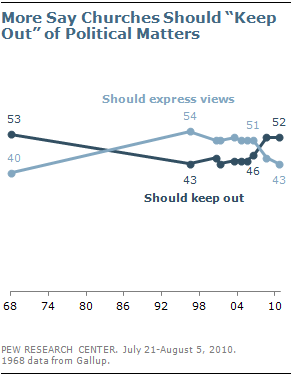
That represented a change from earlier in the 2000s and the 1990s, when more Americans supported churches and other houses of worship speaking out on political matters. However, opinions in 201o were nearly identical to those in a 1968 Gallup survey, when 53% said churches should keep out of political matters.
While support for churches’ involvement in politics has fluctuated, there has been consistent agreement over the years that houses of worship should not directly endorse political candidates. In 2010, 70% said churches and other houses of worship should not come out in favor of one candidate over another; just 24% say they should. These opinions have changed little over the past decade.
The public has been divided over the amount of expressions of religious faith by politicians: in 2010, 37% said there had been too little expression of religious faith by political leaders while 29% said there had been too much, and 24% said political leaders expressed religious faith the right amount. These opinions also had shown relatively little change from previous Pew Research Center religion and politics surveys.
More Oppose Churches Expressing Political Views
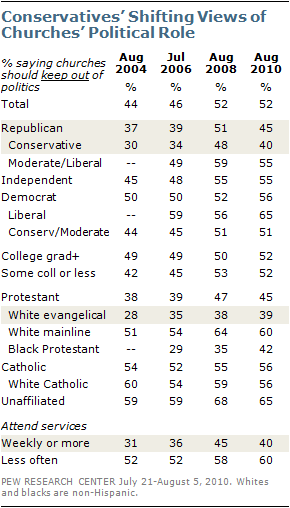
From 2004 to 2008, there was a sharp increase in the percentage of Americans saying that churches and other houses of worship should keep out of political matters. Notably, much of this change came among conservatives. (See “More Americans Question Religion’s Role in Politics,” Aug. 21, 2008.)
In 2004, just 30% of conservative Republicans said houses of worship should keep out of political matters. But in 2008, 48% of conservative Republicans expressed this view; that percentage fell to 40% in 2010.
Democrats’ opinions about the role of churches in politics changed less during this period. In 2010, 56% said they should keep out of political matters, which was comparable to opinions in 2008 (52%) and 2004 (51%).
White evangelical Protestants are more supportive of an active political role for churches and other houses of worship than are members of most other religious groups. In 2010, 39% of white evangelicals said churches should stay out of political matters; that compared with 60% of white mainline Protestants and 56% of white Catholics. Still, the percentage of white evangelicals saying houses of worship should stay out of political matters increased from 28% in 2004 to 39% in 2010.
Church Endorsements, Politicians’ Expressions of Faith
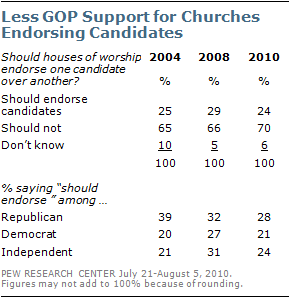
The public has consistently opposed churches making political endorsements: In 2010, 70% said that during elections churches and other houses of worship should not come out in favor of one candidate over another. Just 24% said houses of worship should endorse candidates. These opinions are little changed since 2004.
The percentage of Republicans supporting endorsements by churches has declined – from 39% in 2004 to 28% in 2010. Opinions among Democrats and independents have shown less change. In 2010, 21% of Democrats and 24% of independents favored churches endorsing candidates.
In 2010, more Americans said political leaders express religious faith too little (37%) rather than too much (29%); 24% said there had been the right amount of expression of religious faith by political leaders.
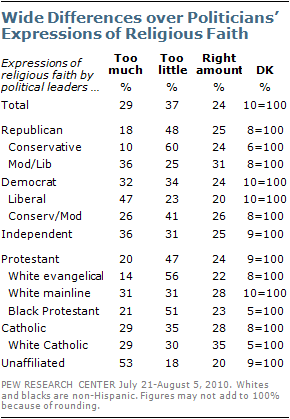
Republicans have long been more likely than Democrats to say there is too little expression of religious faith by political leaders. But both parties are divided over this issue.
Fully 60% of conservative Republicans said there was too little expression of religious faith by political leaders; just 25% of moderate and liberal Republicans agree. Among Democrats, 47% of liberals said politicians mentioned religious faith too much, compared with just 26% of the party’s conservatives and moderates.
Among religious groups, a majority of white evangelical Protestants (56%) – and about the same percentage of black Protestants (51%) – said there was too little expression of religious faith by political leaders. Other religious groups are more divided. Among the religiously unaffiliated, 53% said there has been too much expression of faith by political leaders.
Parties’ Friendliness to Religion
Since 2003, the GOP has consistently been viewed as more friendly to religion than the Democ
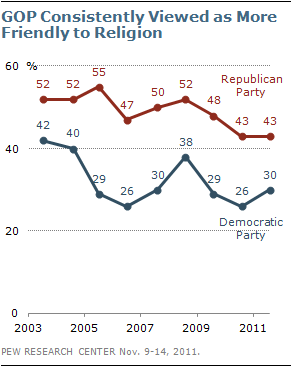
ratic Party. In November 2011, 43% of Americans said the Republican Party was friendly to religion, while 30% said the Democratic Party was friendly to religion.
But the percentages saying each party is friendly to religion have declined in recent years. Last November, 43% said the Republican Party was friendly to religion, 26% said the GOP was neutral toward religion, while 19% said it was unfriendly. From 2003-2008, about 50% viewed the GOP as friendly to religion.
Opinions about whether the Democratic Party is friendly to religion have fluctuated in recent years. In the 2010 survey, 30% said the Democratic Party was friendly to religion. A plurality (40%) said the Democratic Party was neutral to religion, and 20% viewed it as unfriendly Fewer said the party was friendly to religion than did so in 2008 (38%) or 2003 (42%). (For more, see “Romney’s Mormon Faith Likely a Factor in Primaries, Not in a General Election,” Nov. 23, 2011.)




